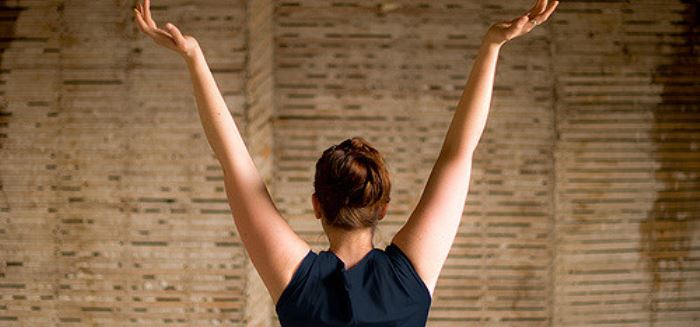I recently attended a large worship conference hosted by a mainline denomination. The liturgy and music was creative, though also on the “traditional” side of the worship spectrum. On the final night of the conference, we sang the hymn, “How Great Thou Art” with 800+ other worshippers. My seat was in the back, so I could hear the gorgeous harmony in full. I could also look over the congregation, and here and there, glimpsed worshipers raising their hands in praise to God. Something about the music inspired worshipers to engage their body beyond their vocal chords.
Raising our hands in worship is a simple act, though I admit one that makes me pretty uncomfortable. It suggests a broader topic: stewardship of body. How does our body relate to God? How is faith implicated when we look in the mirror? This week’s writer, Ellie Roscher, continues our Beyond the Offering Plate: A Holistic Approach to Stewardship series considering just those questions.
Yours truly,
Adam Copeland, Center for Stewardship Leaders
Stewardship of the Body
Ellie Roscher
Bodies matter to God. The creation of our bodies took time and contemplation, mud and breath. God works with Adam over time to create a suitable partner. Then God took on a body. Now nothing—not even the death of our bodies—can separate us from the love of God. There is a tenderness in God’s knowledge of our bodies, yet there is a pervasive ignoring of those bodies in our church.
Body estrangement plays a role in obesity and eating disorders, unhealthy sexual behaviors and addictions. To address racism, misogyny and homophobia, we must acknowledge our bodies. As James B. Nelson has wondered, what is hindering us from the awe and appreciation of our bodies that stewardship requires?
Dangerous Dualism
The book Song of Songs, in the Old Testament, gives a sense of how bodies were celebrated in Pre-Christian Hebrew life. The Greeks, however, embraced a mind-body dualism. Plato distinguished between the sacredness of love that comes from the soul and the profanity of love that comes from the body. The mind is pure, while the body is dirty.
Leaders in the early church thought the end times were near, and wanted to differentiate itself from the rest of society. Virginity, chastity, purity, piety and ultimately martyrdom were all virtues of the early church. Suspicious of his libido, Augustine tied sex to original sin. Dualism then thrived in the Middle Ages as physical penance punished the body for its ability to override logic and reason. Aquinas, Calvin and Luther connected bodily pleasure to the Fall. The mind was holy, bringing us closer to God. The body was sinful, tugging us toward hell.
Dualism today looks like physical deprivation as religious practice, seemingly God-ordained, Bible-backed misogyny and homophobia, and standing still in worship. We take communion, the body of Christ, without letting that nourishment transform how we treat our bodies.
Church and Bodies
The church’s disembodiment reflects societal struggles as well. We eat our food without tasting it, we buy gym memberships but don’t go, we ignore headaches by popping more Advil, and we relax to hours of television every night. I have to imagine God’s vision for our lives incorporates our bodies. Won’t body wellness contribute to us becoming our best, most authentic selves?
We in the church today have an opportunity to be the leaders in body stewardship. We are free to deny mind-body dualism because we don’t worship Augustine or Luther. We worship Jesus. And bodies matter to Jesus.
God, Embodied
In life, by bringing sight to the blind, stopping the flow of blood, and bringing people back to life, Jesus restored not only people’s health but their status. He brought people on the margins back into the center of society. He healed with a gentle human touch that many must have craved in a society that shunned and blamed them for their afflictions.
In death, Jesus’ body was disrobed, whipped, spat on, and put to death. Jesus cried out to God, feeling abandonment in his body. Taking on the darkness of humanity, experiencing death as a slave and enduring it, he handed divinity over to us, the very ones who deserve it the least. We believe that Jesus, fully God and fully human, suffered and died and rose again. At the center of our faith is suffering so at the center of our faith can be love. God took on a body so that we could fall in love with Christ. In communion we are reminded of this gift, sustained by Jesus’ body and blood.
As followers of Jesus, as worshipers of God, as students of The Song of Songs, we the church can lead the way back to our bodies. The courageous journey can bring healing and reconciliation, abounding with wonder and awe.
*Want to read more? A fuller version of this post appears in the new book, Beyond the Offering Plate: A Holistic Approach to Stewardship, edited by Adam Copeland. To order visit: Amazon, Westminster John Knox Press, or Barnes & Noble.
More Information:
Ellie Roscher writes, edits and teaches at the crossroads of faith, simplicity, gender, sexuality, and justice education. Author of Play Like a Girl and How Coffee Saved My Life, she lives in Minneapolis with her spouse and two sons.

